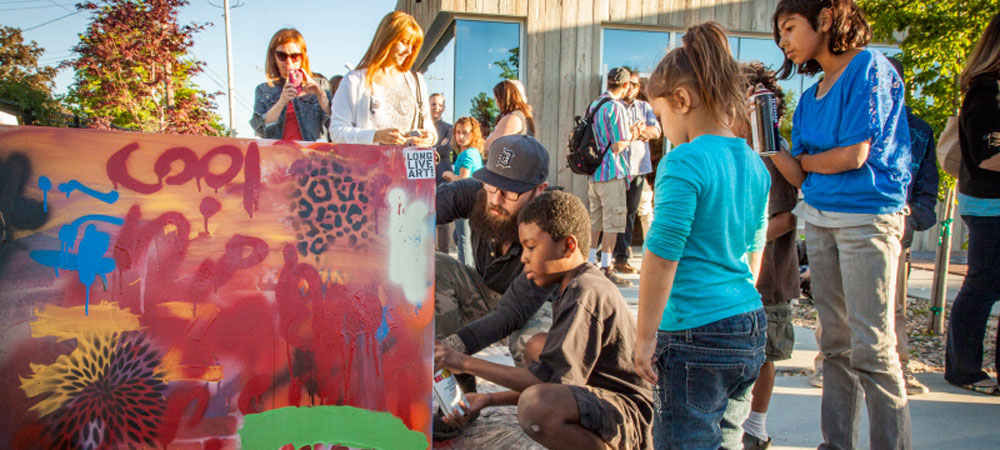
Hip-hop education was the topic of discussion at this summer’s ACME session at the Glendale Library. Read this post by Courtney-Rae Reinecke, reposted from the UMFA blog, to hear how it went. And check out the video recap below.

Outside the Glendale Branch of the Salt Lake City Public Library, break dancing erupted when DJ Dynamic started busting out the beats. Onlookers ate pizza and enjoyed the dancing and music, while artist Zach Franzoni from Mestizo Institute of Culture and Arts prepped canvases for a collaborative graffiti session. As the crowd swelled (ultimately to some 200 people), so did the excitement for what this May 11 ACME Session hosted by the Utah Museum of Fine Arts—“What’s Hip Hop Got to Do with Education?”—had in store.
ACME (Art. Community. Museum. Education.) is the UMFA’s outreach initiative dedicated to rethinking the public role of the museum. These bimonthly ACME Sessions bring together Salt Lake City’s most creative, inventive, and cross-disciplinary minds—K–12 educators, artists, museum professionals, university faculty and students, engineers, scientists, technologists, activists, researchers, and others. May’s session was designed to demonstrate the value of hip-hop as a relevant educational vehicle.
Jarred Martinez and Saia Langi from Truth Cypher, a Salt Lake-based community of writers, storytellers, and spoken word artists, started the session with a poem. They talked about the importance of school but also how hip-hop can help teachers connect with their students in more meaningful ways.

Jorge Rojas, UMFA director of education and engagement, gave a bilingual rundown of the ACME initiative. Paul Kuttner, the University Neighborhood Partners’ Education Pathways Partnership manager, explained that this session was designed to recognize hip-hop culture’s approach to learning and how to use it to transform traditional schooling methods to better serve our diverse youth.
Kuttner turned the audience’s attention to a poster that explained the original four “elements” of hip-hop, each of which line up with a different kind of “intelligence,” as proposed by Harvard University professor Howard Gardener’s theory of multiple intelligences.
Keynote speaker Robert Unzueta, a hip-hop and social justice professor at the University of Utah, then jumped in to explain that hip-hop is both an art medium that gives voice to marginalized communities and also a venue for knowledge production. He taught participants that marginalized communities use hip-hop as tool to engage in critical dialogue and action against social injustices. After Unzueta read Tupac Shakur’s “The Rose that Grew from Concrete,” participants split into four breakout sessions to deepen the conversation:
- Graffiti Art—Visual-Spatial Intelligence led by Franzoni.
- Hip-Hop Dance—Bodily-Kinesthetic Intelligence led by Josh Perkins and the BBoy Federation
- Turntablism & Producing—Musical Intelligence led by Luis Lopez, then-program coordinator of Artes de Mexico en Utah
- Emceeing/Poetry—Verbal-Linguistic Intelligence led by Martinez and Langi from Truth Cypher
 These stations provided four different contexts in which to explore two specific questions: “How does learning, teaching, and social change happen through hip-hop?” and “How can hip-hop culture help us rethink and transform schooling?”
These stations provided four different contexts in which to explore two specific questions: “How does learning, teaching, and social change happen through hip-hop?” and “How can hip-hop culture help us rethink and transform schooling?”
After two rounds in which all participants discussed both questions, everyone joined together in a cypher of chairs to conclude the evening. A hip-hop cypher is a space for dancers or emcees to create room for each other to have their time and then step back so someone else can have their time, a place for listening and building off what others have to say. In this cypher, participants explained what they did and what they learned, sparking a discussion among the educators, parents, and students who gathered. All expressed their wishes to integrate what they learned in the Acme Session into traditional schooling.
Because of the excitement triggered by this ACME Session’s enthusiastic turnout, session leaders proposed a follow-up meeting to maintain the momentum, from bringing together a larger “think tank” in the Salt Lake City area to creating workshops for educators and artists. Stay tuned for more upcoming events!
P.S. Here’s a list of resources compiled by the session leaders that you can use to explore how to integrate hip-hop into your own curriculum and classrooms!
Books
Urban Science Education for the Hip-Hop Generation by Christopher Emdin
Hip-Hop Genius by Sam Seidel
Black Noise by Tricia Rose
Hip-Hop Wars by Tricia Rose
Can’t Stop, Won’t Stop by Jeff Chang
Schooling Hip-Hop: Expanding Hip-Hop Based Education across the Curriculum, edited by Marc Lamont Hill and Emery Petchauer
The Organic Globalizer: Hip Hop, Political Development, and Movement Culture, edited by Christopher Malone and George Martinez
Black Noise by Tricia Rose
The Art of Critical Pedagogy by Jeffrey M Duncan Andrade
The Hip-Hop Reader by Tim Strode and Tim Wood
Holler If You Hear Me by Michael Eric Dyson
That’s The Joint Reader by Murray Forman and Mark Anthony Neal
Organizations
#HipHopEd, a network co-created by hip-hop educator Christopher Emdin
B.Love, the website of hip-hop educator Bettina Love
High School For Recording Arts, an entire school focused around hip-hop and music production
The Good Life Organization, a Chicago-Based group that developed the “Fulfill the Dream” curriculum
Videos
Urban Science Education for the Hip-Hop Generation
Hip-Hop Genius: Remixing High School Education
Hip hop, grit, and academic success: Bettina Love at TEDxUGA
